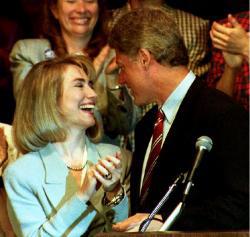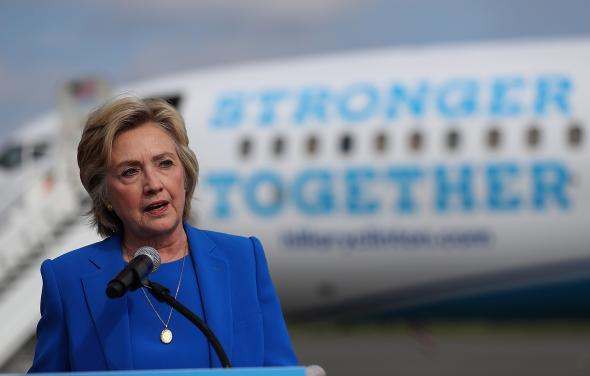In the fall of 1992, when I was a freshman at Yale and Bill Clinton was running for office, the best thing that happened to me was meeting Hillary Clinton. The worst was being raped by a fellow student who said he was going to run for president one day.
I tell the story of meeting Hillary all the time. I almost never tell the other one.
I’d turned 18 right before school started. This was the first election I’d paid any attention to, and I knew just enough about Bill Clinton to find him slightly disappointing. I was a lot more excited about Hillary. It’s easy now to forget how different she was from other candidates’ wives. She’d been a working mom and a working first lady in Arkansas. She was famously outspoken, and Bill said if he were elected we’d get two presidents for the price of one. When she came to campus to give a campaign speech, I signed up to volunteer, even though I’d have to postpone my first big exam.
After the speech, the campaign staffer in charge of the volunteers told us that Hillary would be coming by to thank us for our help. I couldn’t stay; I had to take that exam. I was so disappointed I almost started to cry. And then I did something uncharacteristically bold for me at the time: I found the staffer and told him about the bind I was in. “Don’t tell anyone,” he said, “but meet me in front of Battell Chapel at 4 o’clock.”
I raced through my test and made it there just before Hillary’s car pulled up. Her staff arranged a receiving line: the dean of the law school, a couple of suited-and-tied professors, and me, still wearing my Clinton/Gore T-shirt and cutoff jeans. She greeted each of us and thanked me for helping with the campaign. Then we all sat together in the front row while she spoke to a roomful of lawyers about how, while studying law, she’d figured out which of the world’s problems she wanted to help solve. She was 44 and had already accomplished a lot, but she talked as though she was just getting started.
People say that Hillary is an uninspiring speaker, that she’s not a good storyteller, and that she fails to emotionally connect with her audience. But as a young woman, I was moved by her matter-of-factness and resolve. Choose a problem and do the work, she said. That was something I knew I could do.
When I thanked her campaign staffer afterward, he said, “One day, you’ll be in a position like mine. Just remember this, and give people opportunities whenever you can.”
* * *
Let’s call the guy David. He was extremely smart and extremely conservative. He’d taped a Bush/Quayle sign to his dorm-room door, which was right next to mine.* We disagreed about everything except that we both loved Paradise Lost, one of the first things we’d read that semester. On a few nights after studying together, we stayed up late arguing about politics, and it was exactly how I’d imagined college would be.
One Saturday night, David walked me home from a party and then he raped me. Afterward, he left so quickly he forgot his underwear beside my bed, leaving me to figure out what to do with it.
I thought the whole thing was my fault. I told a couple of my friends what had happened, and that was it. I tried hard to move on.
But it didn’t stop there. One night he trashed his room after seeing me talking to one of his friends. He told me he knew that what he’d done to me was wrong. As the winter wore on, he became increasingly threatening. He returned my copy of The Fountainhead with all of the rape scenes and misogynistic speeches highlighted. (Why had I even brought it to college in the first place? It was such an awful, disturbing book.) He came into my room when I wasn’t there and poured bleach into my fish tank. On Valentine’s Day, he nailed a dead mouse to my door by the tail, a “Roses are red” poem attached to it.
None of that was enough to make me report him. I felt ashamed. And I was scared of what he’d do next, if he found out I’d told anyone.
I found myself thinking about Anita Hill a lot. It had been only a year since Clarence Thomas’ confirmation hearings. I imagined coming forward to testify, 30 years in the future, if David actually ran for public office—if that ever happened, I’d need to be able to corroborate my story. I knew this was dramatic, but I also believed it was possible. Then–President Bush had gone to Yale. Bill and Hillary Clinton had graduated from the law school. So had Clarence Thomas and Anita Hill.
I told my counselor I just wanted her to know, in case anything worse happened, but I didn’t want David to find out I’d said anything. She believed all of it, which was a surprise and a relief. But she was only a senior, not much older than us, and this was 24 years ago. She agreed not to tell our college dean, but she did tell David’s counselor, who talked to David, who denied everything. Our counselors tried to help as best they could but ended up in a proxy war of “he said, she said.” I decided I had to go to the dean.
The dean told David he could finish the semester, as long as he stayed away from me. And sophomore year, he had to agree to live off-campus, so that I wouldn’t have to live in the same building as him again. My counselor told David privately that if she found out that he’d come anywhere near me, even once, she’d go straight to the New Haven Police, and they would not be nearly so lenient.
David never talked to me again. But not long before I graduated, one of his former roommates told me that he’d assaulted at least one other woman after me. By then, I understood that what he’d done to me wasn’t my fault. But if I’d been braver about speaking up, if I’d asked the university for more support or gone to the police myself, I might have been able to prevent what he’d done to another woman, or women. I spent a lot of time regretting that.
* * *
As I grew older, I saw that Clinton’s campaign staffer had been right. I was privileged to find myself in jobs where I had power to give other people opportunities, and I took that responsibility seriously. The more I accomplished at work, and the more generous I learned to be, the more confident and purposeful I became. I stopped trying so hard to make sense of everything that had happened to me—not just David, but all the things I couldn’t control—and focused on what I was capable of instead.
Meanwhile, I watched Hillary Clinton move on from standing by Bill in humiliating circumstances to become a senator, a presidential candidate, secretary of state, and then the first woman nominated to be president of the United States.

Mark Phillips/AFP/Getty Images
The fact that the first female nominee has had to endure the indignity of running against a man as hateful and incompetent as Donald Trump is embarrassing and sad and terribly frustrating. But the longer this campaign goes on, the more inevitable all of it seems. I’m an editor at Harvard Business Review. Every week, I see new evidence of how difficult and profoundly unfair many workplaces still are for women. And yet, power is finally beginning to shift. Many American men see rights as a zero-sum game, and they now feel that they’re the ones facing gender discrimination.
Threats of sexual violence—including comments like the ones Donald Trump and Billy Bush made on the Access Hollywood bus, and the ones recounted by Trump’s seemingly endless wave of accusers—aren’t just a consequence of the system that has kept men in possession of nearly every form of public power for hundreds of years. They are integral to that system.
So it makes sense that we are talking about rape and sexual harassment this much. It makes sense that this showdown is so sickening and painful. Of course Hillary has to remain composed and gracious in the face of Trump’s misogyny and Bill Clinton’s sordid past, and patiently remind us of everything she’s achieved. All professional women have to do this at times, to some extent. But Hillary Clinton is a master of the form. She’s had more practice at it than any of us.
Here is what I’ve learned from watching Hillary since 1992: She refuses to be defined by what has happened to her or by what other people have done. Again and again, she changes the subject back to what she wants to do, to what she can do, to the work at hand. She insists that what she does is who she is. And that gives her power no one has been able to take away, no matter how hard they’ve tried.
Every year or so, I Google David’s real name. I have never found any evidence of him on the internet, which means as far as I’m concerned he might as well not even exist. I hope he isn’t still hurting women, wherever he is. But at least I know that he’s never going to be president.
Hillary Clinton is.
Correction, Oct. 15, 2016: This article originally referred to a “Bush/Dole” campaign poster; the correct signage would have been “Bush/Quayle.” (Return.)
